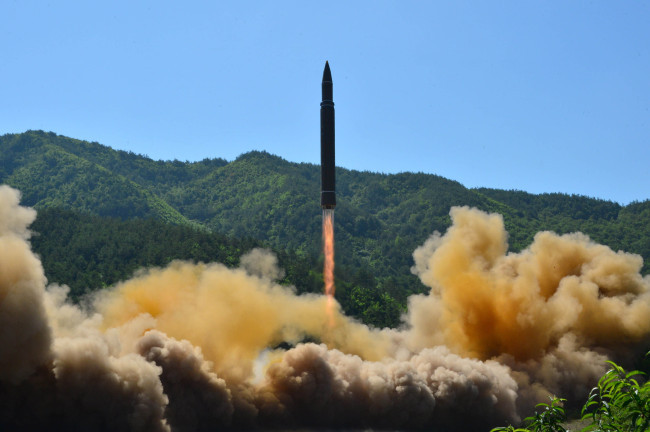[News Focus] US officials, experts raise concern on NK's ramping up in ICBMs
By Ahn Sung-miPublished : Sept. 3, 2020 - 16:09

Senior US officials and experts on North Korea are increasingly concerned that Pyongyang is ramping up its long-range missile capabilities, with the possibility of introducing a new solid-fueled intercontinental ballistic missile at the upcoming military parade in October.
“We know that North Korea is trying to increase the size of its ICBM capabilities, maybe even move to a submarine launched ballistic missile, but we don’t know the extent of that,” said Rob Soofer, deputy assistant secretary of defense for nuclear and missile defense policy, during a webinar hosted by the US-based Mitchell Institute for Aerospace Studies on Wednesday (local time).
Soofer stressed that Washington was beefing up its missile defense capabilities, including deploying the standard missile-3 (SM-3) block IIA interceptor, which is designed to destroy short- and intermediate-range ballistic missiles, but which the US hopes will work against longer-range weapons.
“We will conduct a test before the end of this calendar year, and if it works, then figure out some way to integrate into our defense,” he said. “And if it does work now, we have the capability to address the North Korean threat.”
On the same day, a US expert on North Korea asserted that the North may unveil its first-ever solid-fueled ICBM capable of striking the US territory with a nuclear weapon at the upcoming Oct. 10 military parade, citing a senior White House official and US intelligence officials.
“That seems to be the most likely of scenarios based on their history -- and it’s what we are expecting, but, of course, we are hoping to be proven wrong,” Harry Kazianis, senior director of Korean studies for the Center for the National Interest, a Washington-based think tank, said in an article published by the center.
The introduction of solid-fuel missiles, which are more easily transportable and can be launched with less preparation, would represent a “generation shift” in Pyongyang’s missile technology, from its current liquid fuel-based long-range missiles, the Hwasong 14 and Hwasong 15, he said.
“Solid-fueled missiles carry the advantage of being able to stay in a fueled and ready-to-strike state. As a result, they are much more reliable and can be launched faster,” he said, contrasting them with liquid-fueled missiles. “This would allow Pyongyang’s ICBMs to truly be completely mobile, making them harder to detect and destroy in a military conflict.”
Seoul’s Defense Ministry in June also raised the possibility that the North could unveil a new ICBM or submarine-launched ballistic missile in a massive military parade to mark the 75th anniversary of the Workers’ Party next month.
In his New Year’s address, North Korean leader Kim Jong-un, frustrated with stalled negotiations with the US, said his country would introduce a “new strategic weapon” in the near future. It also announced that Pyongyang is no longer bound by its self-imposed moratorium on testing nuclear weapons and ICBMs, indicating it will resume such tests.
David Stilwell, assistant secretary of state for East Asian and Pacific affairs, said Wednesday that there was strong evidence of continued cyber theft by the North, with the goal of funding the state’s missiles program.
“It is a clear threat. As you know a lot of those cyber actors are operating in other places in a dispersed manner. Getting at this is going to be difficult,” Stilwell said during a press conference in Washington. “But again, there’s strong evidence that they do operate in that regard. And the goal I find is to get currencies, to get funding to continue with missile procurement and the rest of it. The quicker we can slow or stop that, the better off we will all be, safer we will be.”
Last week, the US government warned that North Korea has engaged in financial cybercrimes recently, with North Korean hackers targeting banks worldwide to make fraudulent money transfers and ATM cash withdrawals since February.
Upping the pressure on North Korea, a group of US government agencies issued a joint advisory on Tuesday, saying Pyongyang continues to procure key equipment and materials for its nuclear and missile development programs. It also warned those aiding the communist state that they may be subject to US and international sanctions.
By Ahn Sung-mi (sahn@heraldcorp.com)







![[Graphic News] More Koreans say they plan long-distance trips this year](http://res.heraldm.com/phpwas/restmb_idxmake.php?idx=644&simg=/content/image/2024/04/17/20240417050828_0.gif&u=)
![[KH Explains] Hyundai's full hybrid edge to pay off amid slow transition to pure EVs](http://res.heraldm.com/phpwas/restmb_idxmake.php?idx=644&simg=/content/image/2024/04/18/20240418050645_0.jpg&u=20240419100350)






![[From the Scene] Monks, Buddhists hail return of remains of Buddhas](http://res.heraldm.com/phpwas/restmb_idxmake.php?idx=652&simg=/content/image/2024/04/19/20240419050617_0.jpg&u=20240419175937)

![[KH Explains] Hyundai's full hybrid edge to pay off amid slow transition to pure EVs](http://res.heraldm.com/phpwas/restmb_idxmake.php?idx=652&simg=/content/image/2024/04/18/20240418050645_0.jpg&u=20240419100350)

![[Today’s K-pop] Illit drops debut single remix](http://res.heraldm.com/phpwas/restmb_idxmake.php?idx=642&simg=/content/image/2024/04/19/20240419050612_0.jpg&u=)